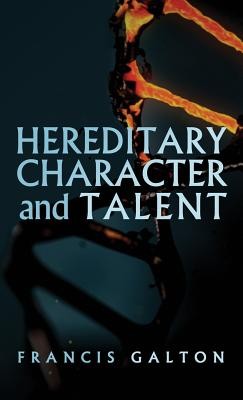
- We will send in 10–14 business days.
- Author: Francis Galton
- Publisher: Suzeteo Enterprises
- ISBN-10: 1947844784
- ISBN-13: 9781947844780
- Format: 14 x 21.6 x 0.6 cm, kieti viršeliai
- Language: English
- SAVE -10% with code: EXTRA
Reviews
Description
A half-cousin of Charles Darwin, Francis Galton was uniquely positioned to be one of the first to consider how the principles Darwin laid out in his "Origin of the Species" could be applied to the human race. Indeed, Galton would be the one to coin the word 'eugenics.' In Galton's influential "Hereditary Character and Talent", he argued that if physical attributes could be subjected to Darwinian principles of selection, 'mental qualities' could be as well. He generated a list of 'notable persons' in order to demonstrate that intelligence and excellence were hereditary. Today, such applications of Darwinism are cavalierly dismissed as 'pseudo-science, ' but there was a time, not so long ago, when they were simply accepted as pure, straight-forward, rock solid, science. This edition is carefully reproduced from Galton's essay, published in two parts, in MacMillan's Magazine, in 1865.
EXTRA 10 % discount with code: EXTRA
The promotion ends in 23d.19:13:08
The discount code is valid when purchasing from 10 €. Discounts do not stack.
- Author: Francis Galton
- Publisher: Suzeteo Enterprises
- ISBN-10: 1947844784
- ISBN-13: 9781947844780
- Format: 14 x 21.6 x 0.6 cm, kieti viršeliai
- Language: English English
A half-cousin of Charles Darwin, Francis Galton was uniquely positioned to be one of the first to consider how the principles Darwin laid out in his "Origin of the Species" could be applied to the human race. Indeed, Galton would be the one to coin the word 'eugenics.' In Galton's influential "Hereditary Character and Talent", he argued that if physical attributes could be subjected to Darwinian principles of selection, 'mental qualities' could be as well. He generated a list of 'notable persons' in order to demonstrate that intelligence and excellence were hereditary. Today, such applications of Darwinism are cavalierly dismissed as 'pseudo-science, ' but there was a time, not so long ago, when they were simply accepted as pure, straight-forward, rock solid, science. This edition is carefully reproduced from Galton's essay, published in two parts, in MacMillan's Magazine, in 1865.


Reviews